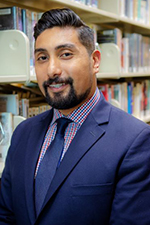
Joseph Rios didn’t always see himself in the field of educational measurement.
“I don’t think anyone grows up wanting to be a psychometrician because most of us don’t know what that is,” he said.
Instead, Rios’ interest was first sparked during his masters program at the University of California – Riverside, while working on an IES funded project to identify reading disabilities in English language learners.
“As part of the study, we were administering measures to students in both English and Spanish, and treating the results as being equivalent. I wanted to know from a measurement standpoint if this was a valid approach.”
From there, Rios finished up his masters and went on to pursue his PhD in educational measurement and psychometrics at the University of Massachusetts, Amherst. He worked for the Educational Testing Service (ETS) for four and a half years, most recently as an associate research scientist.
While at ETS, Rios worked operationally on student learning outcomes assessment in higher education. He helped to develop a new assessment of intercultural competency for university students as well as conducted research on test taking effort in low stakes testing.
“One of the issues we have in the U.S. is that we assess students at the end of the year to find out how they are doing at the state and national level. These tests have no personal consequences associated with their results, and because of this, sometimes students don’t try.”
Rios explained that his research—which continues today—aims to identify when students are giving non-effortful responses and, consequently, when we are underestimating what they have learned. Building on this work, he’s interested in developing interventions to motivate students either before or during the testing process to get a more accurate portrayal of their ability.
Transitioning to academia
Last fall, Rios started as an assistant professor in the Department of Educational Psychology’s quantitative methods in education program.
“I wanted more intellectual freedom,” he said of his decision to come to academia. “I wanted to be able to conduct research that wasn’t just specifically related to industry. There is a lot of research needed to understand how to improve evidence-based practices in the field.”
In addition, Rios was interested in coming to the University to have the opportunity to work with students and often reflects on his own experiences in grad school.
“I was very lucky at the University of Massachusetts to have fantastic professors and advisors who were incredibly busy but would still take their time to meet with us for 30 minutes,” he recalled.
Rios also recognizes that there’s a lack of diversity in the field of quantitative methods.
“I want to help to be a mentor to those who may have different backgrounds or experiences from the typical student,” he said.
Making an impact
Rios is particularly interested in being in “one of the top educational psychology departments in the country” where he’s able to work across programs to conduct interdisciplinary research.
“Right now, Martin Van Boekel and I are looking at the role of feedback in assessment and how we can more accurately target feedback to individuals, considering we all have different personalites and social emotional skills,” he said. “Is there a way we can provide feedback so that people have positive emotional reactions to it, particularly when the feedback is negative?”
Since starting in September, Rios has organized and hosted a Monthly Educational Measurement Speakers Series, regularly bringing in leaders in the field to talk about their research. He’s also partnered with senior lecturer Andy Zieffler to start a Quantitative Methods in Educational Psychology Reading Group.
“We’re trying to have intellectual discussions in a way that isn’t class based,” Rios said. “It helps to train students to be critical thinkers.”
In addition, he is currently working on four different projects with graduate students. All of his interactions with students are helping him to think about developing courses to strengthen their skill sets. For instance, this semester he’s teaching a new class on Using R for Psychometric Analyses and Simulations.
“I’m really excited to teach courses that help students gain the skills necessary to begin conducting research on their own,” he said.
Balancing life and work
Rios lives a healthy lifestyle and swears regular exercise and good eating help him be more productive. He’s also an avid reader and enjoys reading biographies of great leaders to “understand what motivates them.” Still new to the area, Rios keeps busy discovering all of the culture the Twin Cities has to offer, visiting micro breweries, and catching an occasional Minnesota United soccer match (although his hometown LA Galaxy are still his favorite).
“Being able to live here in a city with a lot of culture and cultural events is phenomenal,” he said.



